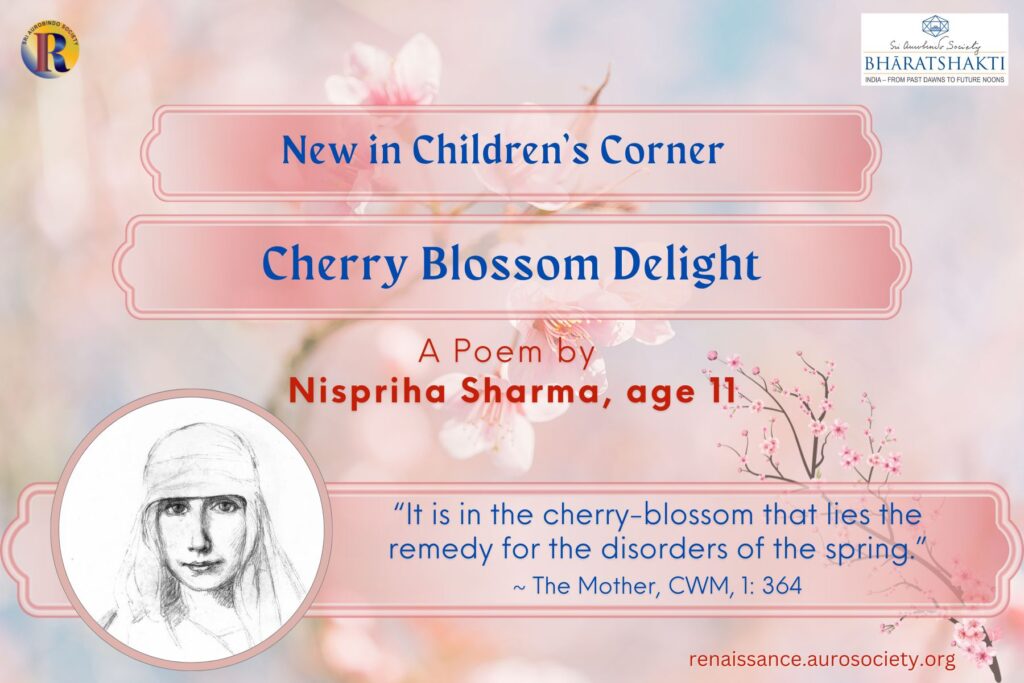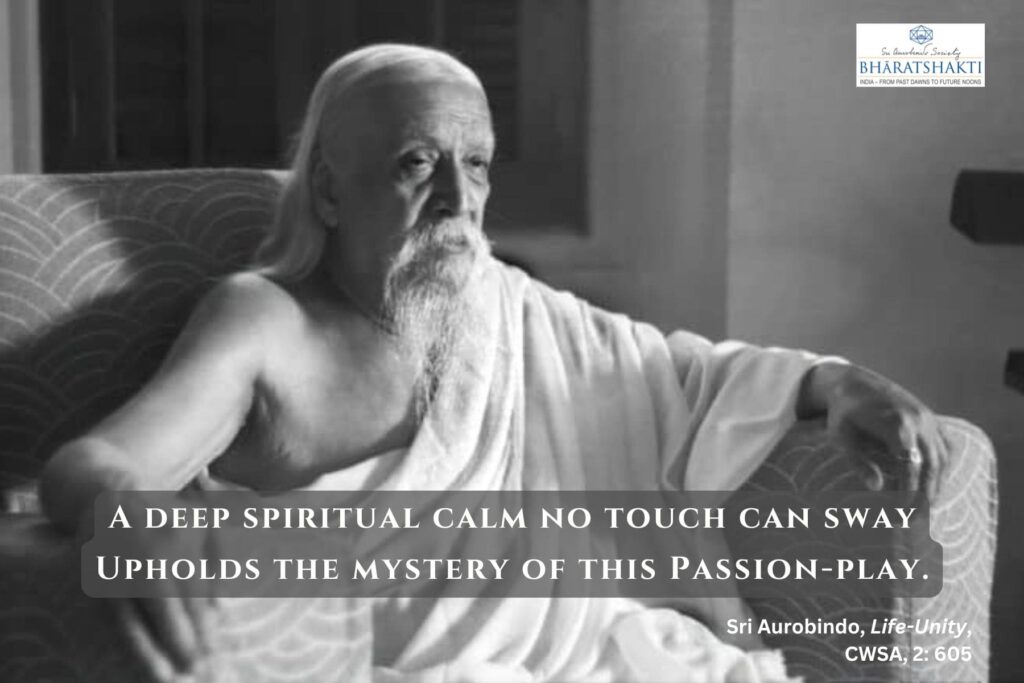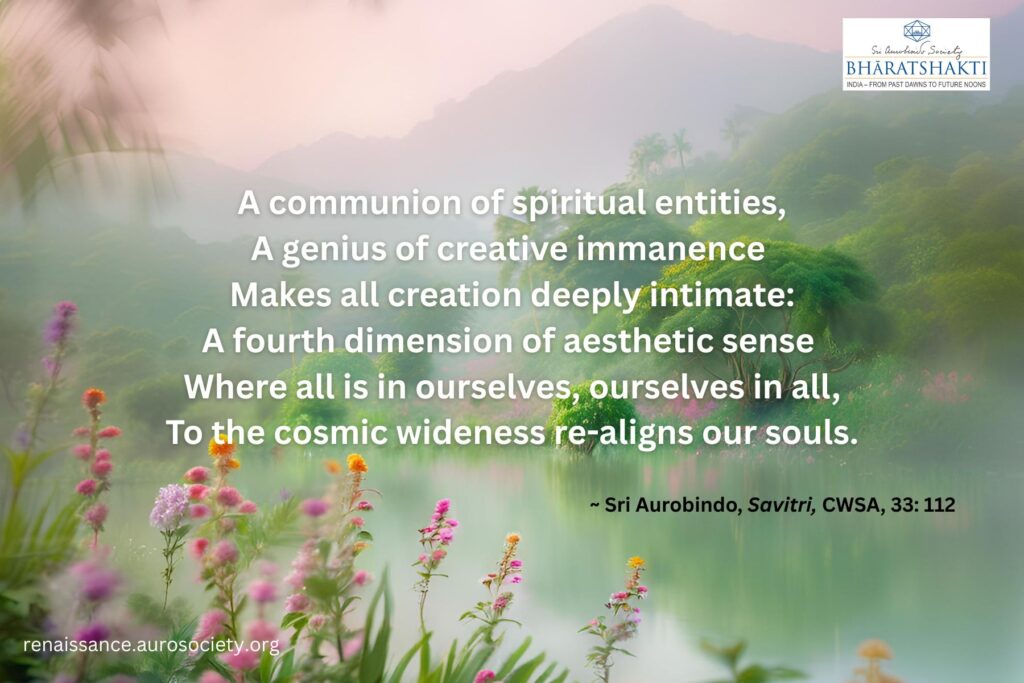Volume 1, Issue 9
Author: Rishabhchand

INTRODUCTION
All spiritual greatness is a surpassing of the normal human consciousness and an embrace of the universal and transcendent. It is a growing out of the ego-moulds and a discovery of one’s true being in the Infinite and Eternal. The essential characteristic of its feeling in regard to the world of relativities is an equal love for all and attachment to none; and either an active beneficence or a passive benevolence is the dominant rhythm of its disinterested life.
But this love takes various forms, springing, as it does, from various sources. And unless we have a clear perception of the sources, we shall not be able to assess its forms at their proper worth. Besides, these forms may express themselves in similar or differing ways in life, according to their inner impulsion or the disposition of the outer forces meeting them.
There is little in the manner of their external expression that can be an index to their original and intrinsic nature. Often a less exalted form of love, destined to play a limited role in a restricted field, has a greater dash and glamour about it than one that has a diviner origin and a wider, if less palpable, scope.
SPIRITUAL LOVE AND ITS MANY FORMS
Love, welling out of spiritual greatness, may take either of the following forms:
- It may be the spontaneous expression of an expanding heart developed or developing in purity, devotion and detachment – a sparkling emotion overflowing the frontiers of the human personality and spreading over all mankind or even all sentient beings and creatures;
- It may be the expression of a profound compassion, which reflects, on the one hand, the freedom of the Spirit and, on the other, a deep solicitude for the deliverance of men from ignorance and suffering;
- It may be born of some natural sympathy or empathy, a feeling of oneness with all somewhere in the depths of one’s being, a translation, in terms of emotion, of the inner joy of a partial or passing spiritual identification; or
- It may be the spiritual expression of a complete and constant identity experienced between one’s whole being and the Divine, who is at once the supreme transcendent Being and the universal All-Being.
I.
The first is the love generally seen in most saints and sages. It is an outpouring of the sattwic gladness and sweetness of the inner being, a joyous self-giving to all and a drawing of all into oneself. Self-sacrifice for the good of others is a natural instinct of this form of love, and service its common impulse.
Sometimes, if it is somewhat passive and ascetic in nature, it yet radiates its smiling peace and sweetness in a settled benevolence. It is an emotion, surging or subdued, of the heart which is widened and deepened and touched by the light of the Spirit.
II.
The second is a child of spiritual freedom and impersonality, issued from the abysmal peace of release from the bondage of egoistic desire and suffering, and moved to reproduce its calm and peace in all. It is more compassion than love – a lofty and serene influence towards purification by renunciation and an eventual escape from the thraldom of the flesh.
Its wide impersonality has a great healing and liberating force, and its gleaming transcendence an overpowering magnetism. Not so much a human emotion as a Spirit-throb and a Spirit-call, it acts as a powerful lever to raise men into the skies of the Spirit.
III.
The third leaps out of an identification between the individual soul and the universal. It is a spiritual emotion, dripping with the authentic Spirit-honey and mystically potent and pervasive. It may exert either of these two influences:
- it may touch the soul into self-consciousness and lead it into Light, away from the darkness of the world, – or into the beauty or bliss of the Supreme, away from the ugliness and unhappiness of the earthly life; or
- it may infiltrate even into one’s life and nature and produce a spiritual springtide in the being.
In either case, it reveals itself and acts as spiritual love, a living force of regeneration, born of identity. It is more than widened human emotion and more than compassion, though comprehending both in its thrilled amplitude. It makes not only the soul of man, but in its enlarging action, even his life bloom in divine splendour.
A flash or flicker of this love can inspire a poet into deathless melodies or a prophet into exalting oracles. The secret of its power lies in the mystic identity from which it springs.
But though it reflects and even radiates the divine Love, more or less in its essential purity and fiery delight, it does not reveal its creative fullness and transforming sovereignty, because the identity from which it proceeds is an imperfect and impermanent identity – spiritual, but not integrally and abidingly spiritual.
The identity may be perfect in the soul in moments of rapt contemplation, but the nature parts – the mind, the heart, the life and the body – get only a reflected and diminished glow of it on account of their deficient receptivity, and can transmit even less than they receive. It is a great but not the supreme epiphany of divine Love.
IV.
The fourth or last is the perfect blossom of the integral and permanent identity. It is the unhampered self-revelation of the divine Love itself in man. It is unlimited, untiring and unquenchable, and radical and universal in its influence and action in the world. It radiates not only from the soul, but from the whole being, and touches not only the soul but the whole being of others.
It flows passionately towards all, because it finds itself in all. It is infinitely more exalting than any human emotion, however wide and deep it may be; it is more powerfully liberating and transforming than compassion, though compassion is one of its redemptive aspects.
It is full of light, full of joy and full of an ineffable beauty and tenderness; but they are so transcendentally divine and so harmoniously dynamic in their expression that their total effect gives it sometimes, in our all too human eyes, the appearance of a cold and distant divinity. And yet it glows with the sempiternal fire and throbs with the unimaginable ecstasy and sweetness of the Supreme.
It is charged with the highest force of the Divine and commissioned to manifest His supernal glory on earth. It overrides all revolt and resistance of the Ignorance and works, in the light of the supreme Truth and with the clairvoyant patience of Eternity, at the very base and centre of life for its radical transfiguration.
This love is born of an integral and permanent identification between the human being and the Divine, and, therefore, incarnates all the illimitable intensity and transmuting passion of the Love Divine.
But rare is its descent in man and rarer its uninterrupted action in him. His physical nature, even when considerably purified and disciplined by the power of his awakened soul, cannot altogether divest itself of its original obscurity, its basic turbidity and the obstinate ego-centrism of each of its parts, and can neither install nor reveal the divine Love in itself.
It can at best be irradiated by its remote rays or softened and sweetened by its seeping nectar. It is only once in several centuries that the divine Love embodies and manifests itself in its fullness in the material world.
UNPARALLELED LOVE FOR MAN AND EARTH
In Sri Aurobindo we see the victorious emergence of this divine Love, and it is this that explains his unparalleled love for man and earth. His attitude towards man and his desire-driven nature, his frail and suffering body and the pervading obscurity of the earthly life stands out in significant relief against the drab background of the condescending pity or sublime indifference of some of the ascetic forms of spirituality.
Sri Aurobindo regards man as not only made in the image of God, but made to manifest God. His nature, though limited and tortured by conflicts, inner and outer, is yet intrinsically divine; it is derived from the Super-Nature or Para-Prakriti and can be converted into it.
It can become luminous and blissfully harmonious. His body is a potential temple of God, a marvellous mechanism for the expression in Matter of the Light and Force and Ananda of the Divine.
And earthly life is the only field – there is no other anywhere in the created universe – where man can realise and reveal God integrally. To condemn earth and spurn earthly life; to disdain human nature and neglect its full development in the mistaken belief that it is incorrigible, – irremediably crooked like the dog’s tail, – to regard the human body with aversion and loathing, is to condemn the instruments God has created for His own manifestation and turn away in a spirit of quasi-spiritual egoism from His Will and purpose in the world.



